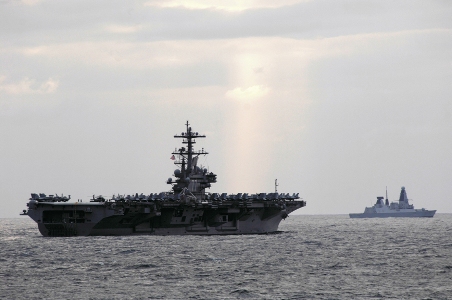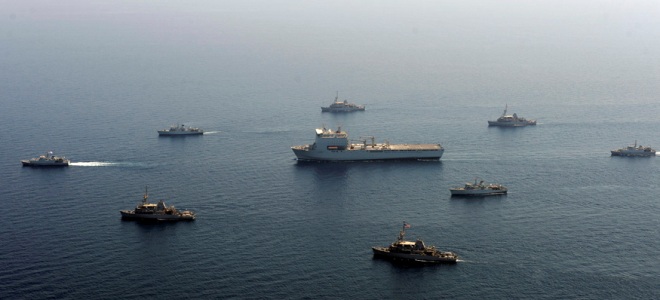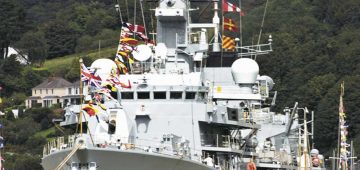COMMENTARY SPECIAL
Bliss Adams suggests a much-quoted reason for lack of maritime awareness should be cast aside for a fresh strategy.

I’m going to go out on a limb and start with something possibly controversial – Sea Blindness is a half-baked concept that hides the true nature of the issue. The more we harp on about our woes using this misnomer, the more we confuse the symptoms with the causes and the further we get from successfully diagnosing and addressing the problems we face. The argument of the past nine months seems to go: ‘The Royal Navy suffered in the Strategic Defence and Security Review because the public don’t understand the Navy because they are stricken by Sea Blindness.’ Post hoc ergo propter hoc [after this, therefore because of this].
But what is this Sea Blindness? It sounds like a term bandied ‘round over coffee or cocktails, amid a fug of despair. It is a passive term that wipes away blame, removes actors and actions from the concept. Sea Blindness is therefore something beyond mortal control and the responsibility lies at the feet of some unknown entity.
Hammer down a bit further and you start to see the shape of the problem. The public are not engaged with the maritime sector. Is that through choice or ignorance? Did the Navy fail to communicate? Did the maritime community fail to engage? Are the public just stupid or is there a deeper conspiracy? Again, this is heading in the wrong direction. Look forward – what are the tools needed to communicate better next time? Words. Who do we need to communicate with? The public.
A theme writ large in the subtext of so many discussions surrounding the health of the Royal Navy is the link between words, power and the public. Words shape understanding and information. Understanding and information make knowledge. And knowledge is power. By shaping and framing the debate as they see fit, different actors are able to mould perception at the key moment when it rushes from belief to reality. If enough people believe something to be true then, in the political world at least, it is. You are no doubt familiar with the phrase ‘he who wins the war writes the history’. At the moment, across all sectors of society and life, we exist in a time when he who writes the history ‘wins the war’ (so to speak). The history of the Navy is being written as you read this – but which author and agenda will triumph will depend on the popular reading.
Inherent in democratic systems is the idea that the people should be heard and answered to. For us, that means the Great British Public and they are busy. They rush helter-skelter through life, being bombarded with information, advertising, pleas and rebukes, from morning to night. They have more ways of communicating and being communicated at (rather than with) than ever before (see the fantastic Social Nomics video on YouTube to fully appreciate this). Amid this hubbub, the individual responds to issues that strike their emotional core – fear, empathy, joy, and recognition of a little part of themselves in a story about another. In order to sell a story (and from time to time a stance as well), journalists tend to zoom in on the story of the individual, reducing and distilling the nuances until a strong and sellable narrative is reached. It must strike that emotional core. Afghanistan now means young soldiers, grieving widows, and brave amputees. Terrorists are omnipresent and evil, motivated by a wicked belief and revenge. Pirates are distant, yet troublesome. Having taking control of the conduit of information, the press and those that feed them control the language and the understanding. The context is so often missing, and the public are pounded in the face with disconnected stories that contradict each other. This builds to a cacophony of confused and misleading strands, alienating many from the world of defence.
Therefore what we have, rather than Sea Blindness is Information Noise – an overload of misleading detail, or to use a more naval explanation, background clutter that obscures the ‘contact’.

Therefore, rather than just wail that Sea Blindness is at fault – a dastardly sickness afflicting those land-lubberly Britons that we cannot cure – we should perhaps clear the clutter first, using accessible messaging (rather than impenetrable corporate speak) and inspiring people to take an interest in naval life, past and present (and please let’s move on from Trafalgar!) is a good start I feel.
A good example of damaging ‘clutter’ was last month provided by a BBC TV news report on a Royal visit to Bletchley Park – the Admiralty code-breaking centre outside London – which of course deserves tributes for its work on cracking the German naval codes, a move that enabled the British to read where the U-boats were operating. The footage used to illustrate this report was completely inaccurate, showing battleship HMS Barham exploding in the Mediterranean, German heavy ships making their Channel Dash breakout in 1942 (the film researcher clearly thought they were RN vessels) and a group of submarines that were certainly not a WW2-era German wolf pack (and may even have been WW1 Royal Navy boats).
The commentary said that Bletchley’s ‘Colossus’ was the world’s first ever computer. In this way it overlooked the amazing achievements of Victorian genius Charles Babbage, the Englishman who can fairly be hailed the ‘inventor’ of the mechanical computer, though you could say that the abacus of the Ancient World was actually the first computer per se. So, the BBC is Mathematics Blind as well as Sea Blind!? The overall impression of the BBC commentary – which certainly did not make clear Bletchley’s overwhelmingly RN connection – was that the maritime forces of the Allies were victims until the valiant chess playing, number crunching code-breakers won the war. The so-called code-breaking propelled turn of the tide was illustrated by footage of aircraft attacking U-boats (which was at least the right war, right nationality, correct type of submarine and proper theatre). It was all a case of prime background clutter, reinforcing another myth that cracking German codes and Allied air power primarily won the sea war when reality was somewhat different. Yes, both played a part but the escort ships of the Allies – British, Canadian and American – with their superior tactics, cutting edge sonar, increasingly effective weapons and convoy system, were actually what turned the tide, supported by the code-breakers and RAF, not the other way around. Above all it was the bravery of navies and the merchant marine that beat the Nazis, with the resources of the USA the primary lifeline that kept the UK in the war. The ‘Ultra’ intelligence product provided by the Admiralty’s code-breaking centre of course spanned penetration of enemy army and air force ciphers, and it was in those two areas that it really did provide a secret war winner. Returning to the BBC’s distorted report, though, it is understandable if we ask: What chance does the modern messaging of the Royal Navy stand with such background clutter, which is pumped out all the time, in an era when WW2 history still grips the national imagination? That’s a valid question, but don’t start wailing about Sea Blindness – do something to clear it away. Send an e-mail to the BBC every time you see such inaccuracy on screen, write letters to papers when you see the falsehoods perpetuated in their pages, get on the radio when you hear the myths propagated during the latter’s inane chatter. Be proactive: Write books, make videos, dominate the blogosphere, set up web sites, get on your hind legs and yell about it.
When it comes to Sea Blindness, the Naval Community must remember that, as the Renaissance scholar Desiderius Erasmus (1466 – 1536) said: ‘In the kingdom of the blind, the one-eyed man is king.’ And by that we mean not following the example of Nelson – who ignored Admiral Hyde Parker’s daft orders at the Battle of Copenhagen in 1801, and achieved a famous victory – but rather winning over the public via confidence in a simple message that enlightens rather than baffles brains. Erasmus also said: ‘Concealed talent brings no reputation.’ So, that means the Senior Service should abandon this idea that its virtues will be understood without boasting about them – I mean you can’t complain about Sea Blindness if you don’t make a noise about what you do and hide what you are up to. The wise old bird Erasmus also sagely observed: ‘Fortune favours the audacious.’ He may not have been much of a sailor, indeed wasn’t one at all, but he believed in free will rather than things being preordained. Therefore the Royal Navy is not doomed to irrelevance and destruction, to fading into nothing, provided it makes sure people can see what it is about and understand what it means to their daily lives at home as well as its role in global security.









Comments
Sorry, comments are closed for this item